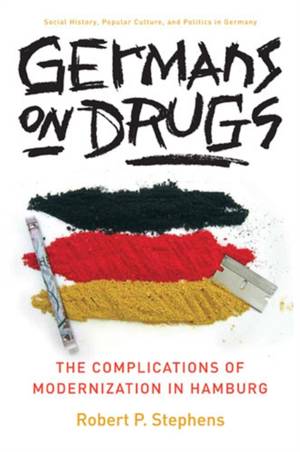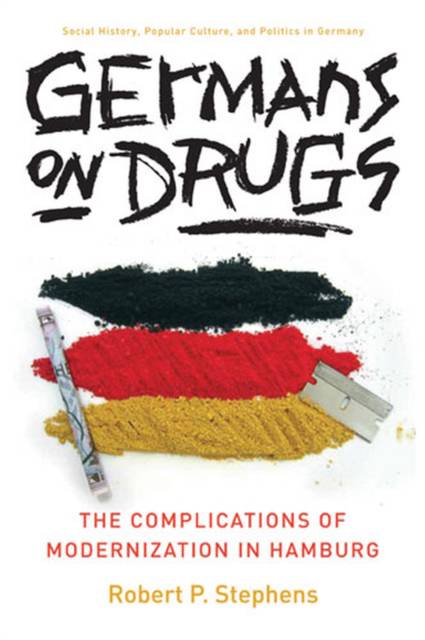
- Afhalen na 1 uur in een winkel met voorraad
- Gratis thuislevering in België vanaf € 30
- Ruim aanbod met 7 miljoen producten
- Afhalen na 1 uur in een winkel met voorraad
- Gratis thuislevering in België vanaf € 30
- Ruim aanbod met 7 miljoen producten
Omschrijving
Germans on Drugs is both a groundbreaking study of the creation of youth drug culture in Hamburg during the 1960s and 1970s and an innovative exploration of the paradoxes of modernization. The very processes that allowed West Germany to flourish after the devastation of the Second World War--consumerism, globalization, and democratization--created the conditions under which a new intractable set of social problems could emerge. Placing Hamburg's drug scene within national and international contexts, Robert P. Stephens examines the ways in which mass consumerism created complicated forms of resistance to state power and cultural norms, and he highlights the fragility of the physical and cultural boundaries of the nation-state in a globalizing world.
"Coming in a rush of historical work on the 1960s and '70s, Stephens's study offers a unique approach. Looking through the lens of drug use and 'the drug problem, ' Stephens brings new understanding to a raft of issues concerning not only the Cold War Federal Republic but also modernization, liberalization, globalization, and consumer society, offering important challenges to still-standing complacencies about the period and about West Germany's glide into 'the West.'"
--Belinda Davis, Associate Professor of History, Rutgers University
"Far more than a local or national study, Germans on Drugs is a lucid model of how research on drug cultures illuminates a remarkable range of historical issues."
--Paul Gootenberg, Professor of History, State University of New York at Stony Brook
"Germans on Drugs covers all aspects of the topic: production, distribution, consumption, practices of social agencies, public discourse, and governmental action. The book presents a vast amount of new insights into a subject that has never before been analyzed systematically. This will be an important contribution to the history of the consumer society in the 20th century."
--Detlef Siegfried, Faculty of the Humanities, University of Copenhagen
"A fascinating book on a fascinating topic. From international trafficking routes to the streets of Hamburg to the halls of treatment centers, Stephens shows modern drug culture as part of consumer society and global trade, and he elucidates mind-reeling shifts in ideals of treatment and control. This is an essential work for anyone interested in the dramatic changes of the 1960s and 1970s."
--Elizabeth Heineman, Associate Professor of History, Lecturer in International Programs, University of Iowa
Robert P. Stephens is Assistant Professor of History at Virginia Polytechnic Institute and State University.
Specificaties
Betrokkenen
- Auteur(s):
- Uitgeverij:
Inhoud
- Aantal bladzijden:
- 328
- Taal:
- Engels
- Reeks:
Eigenschappen
- Productcode (EAN):
- 9780472069736
- Verschijningsdatum:
- 1/04/2007
- Uitvoering:
- Paperback
- Formaat:
- Trade paperback (VS)
- Afmetingen:
- 158 mm x 226 mm
- Gewicht:
- 453 g

Alleen bij Standaard Boekhandel
Beoordelingen
We publiceren alleen reviews die voldoen aan de voorwaarden voor reviews. Bekijk onze voorwaarden voor reviews.











